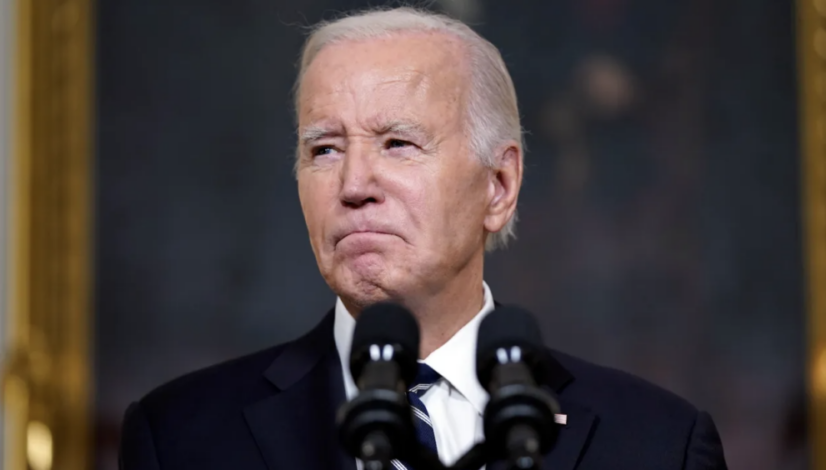Why is Biden ignoring Iran’s influence in the Hamas attacks? It’s simple — politics.

Critics of Joe Biden are furious that in his denunciations of the terror attacks on Israel he has not once mentioned Iran.
They don’t get it. If Biden blames Tehran for masterminding and funding the horrific killings of Israeli citizens, he will have to take the next step, which is to punish Iran’s leaders for the senseless barbarism. That next step would include harsh sanctions, including reining in Iran’s oil exports.
But curbing the flow of Iranian oil would drive up the price of gasoline here in the U.S. Higher prices at the pump correlate closely with Biden’s approval ratings; if the cost of a gallon of gas goes up, his polling goes down. Biden cannot survive another downdraft in his approval ratings, which are already the lowest of any president in a generation.
It is notable that oil prices have moved only slightly higher since the Hamas attack. The betting is that the White House has no stomach for real penalties on Iran.
Joe Biden’s response to the horrors perpetrated by Hamas terrorists has been entirely inadequate. The bar is now set so low for this president that liberal media outlets were ecstatic that Biden could raise his voice and display anger at babies being beheaded and Americans being held for ransom. The New York Times’s Peter Brooks waxed poetic about the president’s 10-minute speech: “He bristled with righteous indignation as he denounced the bloody Hamas attack in unforgiving terms and vowed to stand by Israel without equivocation.” Good for President Biden!
Unfortunately, that righteous indignation is not likely to translate into meaningful pushback against the region’s main sponsor of terror.
Senate Minority Leader Mitch McConnell penned an op-ed in The Wall Street Journal insisting that Biden “reimpose extensive multilateral sanctions on Tehran and deny Iranian planes overflight rights. Impound the shipping vessels Iran uses to circumvent sanctions. Close Iranian banks with access to the West, and cease the Iranian operations of European businesses. Treat Iranian officials like pariahs and sink Iranian naval boats that threaten international shipping.”
These are excellent suggestions. But first and foremost, the U.S. must cut off Iran’s oil shipments, its primary source of revenues.
Because the Biden administration has been eagerly pursuing a nuclear agreement with Tehran, White House officials admitted to Bloomberg News that they have relaxed sanctions on Iran. The impact of that idiocy has been that Iran’s oil exports, which languished at less than 800,000 barrels per day under President Trump, soared to around 1.7 million b/d in August. (Some put the figure even higher, at 2 mb/d.) According to one estimate, that means Iran raked in $30-$40 billion in extra revenues this past year. Forget the $6 billion held by Qatar that Biden’s team recently unfroze; the jump in oil revenues was more than enough to fund the malevolent activities of Hamas, Hezbollah and other terror proxies.
Are we certain that Iran was involved in the barbaric attacks on Israel? The Wall Street Journal has reported that “Iranian security officials helped plan Hamas’ Saturday surprise attack on Israel and gave the green light for the assault at a meeting in Beirut last Monday,” citing senior members of Hamas and Hezbollah. They clarified that, “Officers of Iran’s Islamic Revolutionary Guard Corps had worked with Hamas since August to devise the air, land and sea incursions.” That seems fairly concrete.
Antony Blinken and others in the Biden White House and the U.S. defense apparatus have said they have no evidence of Iran’s involvement, but, as indicated above, they have excellent reasons for denying the possibility. In addition to not wanting to crack down on Iran’s il exports, the Biden team appears bizarrely optimistic that a nuclear agreement with Iran might actually yield some benefits, despite copious evidence to the contrary.
In recent days, attacks on Israel have also come from the north and from Hezbollah, an Iranian proxy. It will be increasingly difficult to deny Tehran’s involvement if the war continues to spread.
Whether Iran helped plan the attacks or simply provided the funding, training and munitions is beside the point. Almost certainly Hamas would not have been able to pull of such a sophisticated multi-pronged assault without the help of Tehran, and would not have dared do so without the mullahs’ approval.
Hence, there is a clear need for reprisals. Yes, we have agreed to send weapons and arms, but our stocks are depleted, thanks to our backing of Ukraine. For that information we have no less an authority than the president himself, who indiscreetly admitted in July that we were “low” on munitions.
That leaves sanctions. Biden is in a tough place, since his war on fossil fuels has cost the United States anywhere from 2 to 3 million barrels per day of lost production. That estimate comes from looking at where drilling in the U.S. might have been were it not for the White House’s delays in issuing permits and leases, and for the imposition of higher fines and fees on oil producers.
Between January 2017, when former President Donald Trump took office and December 2019, oil production in the U.S. grew 41 percent; output dropped when COVID hit. Under Biden, output has grown only 16 percent from artificially depressed levels through last July. We have, at 13 million barrels per day, finally surpassed the peak reached under Trump — but we could have done so much more.
Americans blame Joe Biden for inflation, which has eaten away at real incomes and the president’s approval ratings. High energy costs have been central to the rise in the cost of living. With recent inflation readings confirming that the battle against inflation is not yet won, Biden cannot afford another spike in gasoline prices.
Do not expect him to exact revenge on Iran — the authors of Israel’s misery — any time soon.



